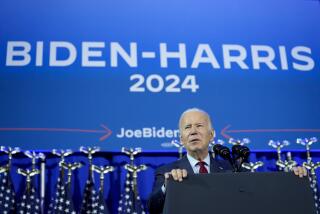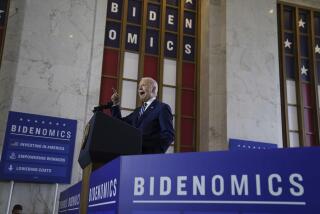Congressional Democrats have a list of resolutions for Obama

Returning to Washington with fewer numbers and increased doubt about their direction in the new Congress, Democrats are pushing President Obama to pursue a more aggressive economic agenda that lays the groundwork for a political rebound in 2016 by focusing sharply on helping the middle class.
In interviews and public speeches since voters delivered an electoral gut-check in November, Democrats have offered a range of ideas for how the president should approach his final two years in office, ranging from specific policy proposals to suggestions for changing the way he works with both parties in Congress.
Democrats worry they lost ground to Republicans due to the absence of a clear economic message that balances claiming credit for progress since the 2008 recession with a call to expand benefits for middle-class families that still need help. Many lawmakers have concluded the presidential bully pulpit will be critical in framing the debate.
“In the minds of a lot of voters, economic fairness and the Democratic brand have in some ways separated, which is really tragic because that really is what we stand for,” said Rep. Keith Ellison (D-Minn.), co-chairman of the House Progressive Caucus. “The president can help rebuild that brand.”
Democrats acknowledge the need for Obama to show he can work with Congress’ new Republican majorities, be it on tax reform, trade or the push to improve infrastructure that appears to be gaining steam.
But many, particularly those in the more progressive wing on the party, say the president needs to fiercely stand his ground on party priorities such as energy, healthcare and Wall Street reform.
“I think he knows where to draw the lines and he will,” said Sen. Sherrod Brown (D-Ohio). “He’ll have plenty of support here to do it.”
Democrats hope the president will craft a more consistent and disciplined economic message than he did last year, when political pressures from the midterm election and a series of unexpected crises at home and abroad posed constant distractions.
“I think he really has to decide what’s most important to him and the country, and then he’s got to work very hard to put an edge on those issues,” said George Miller, the just-retired veteran Democratic congressman from Martinez. “You can’t just do that with a single speech. You can’t just do that with a meeting or having a group of people to the White House. … Every day you’ve got to put your long pants on and go to work.”
Obama’s relationship with his congressional allies has always been complicated, whether Democrats enjoyed significant majorities, as they did at the start of his first term, or after Republicans took over the House in the 2010 election.
Those differences have become more public since the November losses. Sen. Charles E. Schumer (D-N.Y.), the third-ranking Democrat in the Senate, suggested in a major speech in November that the decision to focus on passing healthcare reform, rather than continuing with a broader economic agenda, was at the root of the party’s struggles today.
“Had we started more broadly, the middle class would have been more receptive to the idea that President Obama wanted to help them,” he said. But the Americans who stood to benefit the most from the law were those least likely to vote, he added. “When Democrats focused on healthcare, the average middle-class person thought, ‘The Democrats are not paying enough attention to me.’”
Obama himself seemed to respond to Schumer in a recent NPR interview, saying Democrats across the board had not made “as good of a case as we should have” about his record, and that the Affordable Care Act was actually “one of the best examples” of how the party was addressing working-class voters’ concerns.
“There’s a burden on Democrats to need to make very clear to a broad swath of working-class and middle-class voters that we are, in fact, fighting for them,” he said.
The party’s challenge in 2015 is to unite with an approach that serves potentially conflicting interests — the president’s desire to cement his legacy and congressional Democrats’ need to set a foundation on which to challenge the GOP in 2016.
“We should all have the same interests in having a strong economic legacy, not only for the president but for the people that we represent,” said Sen. Amy Klobuchar (D-Minn.), a new member of the Democratic leadership team in the Senate. “I hope those interests will merge, and that includes doing what we can on income inequality … and the kind of things that there might be some common ground on.”
Some pointed to the aggressive moves made by the president since the election — on immigration and in foreign policy — as hopeful symbols that Obama will not hesitate to wield his clout when necessary.
“I think he’s already got his swagger back and is starting to have fun again in the job,” said Sen. Brian Schatz of Hawaii, where Obama has been on vacation with his family for two weeks. “I think he should feel free politically to try to fulfill every promise that he made in 2008 and 2012. And I think what he will find is rather than turn off independent and centrist voters, they will be attracted to a president on the move, who is taking action and not waiting for a Congress which has demonstrated its desire to stop him.”
Sen. Tim Kaine (D-Va.), one of Obama’s earliest political backers and the Democratic National Committee chairman during the president’s first term, said Obama should shed his “admirable” reluctance to be seen as taking credit for successes.
“We would have these conversations and I would say, ‘Look, you’ve done something that’s very positive. You ought to tout it,’” Kaine recalled. “Your opponents are going to argue against you with the full force that they can muster, even to the point of making ridiculous arguments. So if you’re not promoting your own positive story when the other side is full-throated in their criticism, then you’re at a disadvantage.”
Others want the president to take a more engaged approach in shaping legislation to prevent Republicans from passing unpalatable bills that he will simply veto.
“The administration can sit back and wait until it shows up on his desk and sign it or veto it, or they can be constantly present in the legislative process,” said Sen. Christopher S. Murphy (D-Conn.). “That hasn’t always been this administration’s strength.”
Other Democrats warned against veering too far out of the political center, particularly if Republicans do the same.
“If the right and the left wants to hold their position just for the sake of just sensationalizing things, you’re not going to get anything done here,” said Sen. Joe Manchin III (D-W.Va.). “There’s not enough of us in the middle to hopefully pull everyone back together with some common sense.”
Former Senate Majority Leader Tom Daschle said his main advice to the president is to be “relentlessly engaging.”
“We have to recognize that we can’t be purists here,” he said. “Whether it’s trade or tax or energy or health, there are a lot of things we can do. I think we’ve got to go with that attitude. Let’s make the most of the next 24 months and see where we can build on what they’ve been able to do so far. There’s a rich agenda if they want to pursue it.”
Twitter: @mikememoli
More to Read
Start your day right
Sign up for Essential California for news, features and recommendations from the L.A. Times and beyond in your inbox six days a week.
You may occasionally receive promotional content from the Los Angeles Times.







